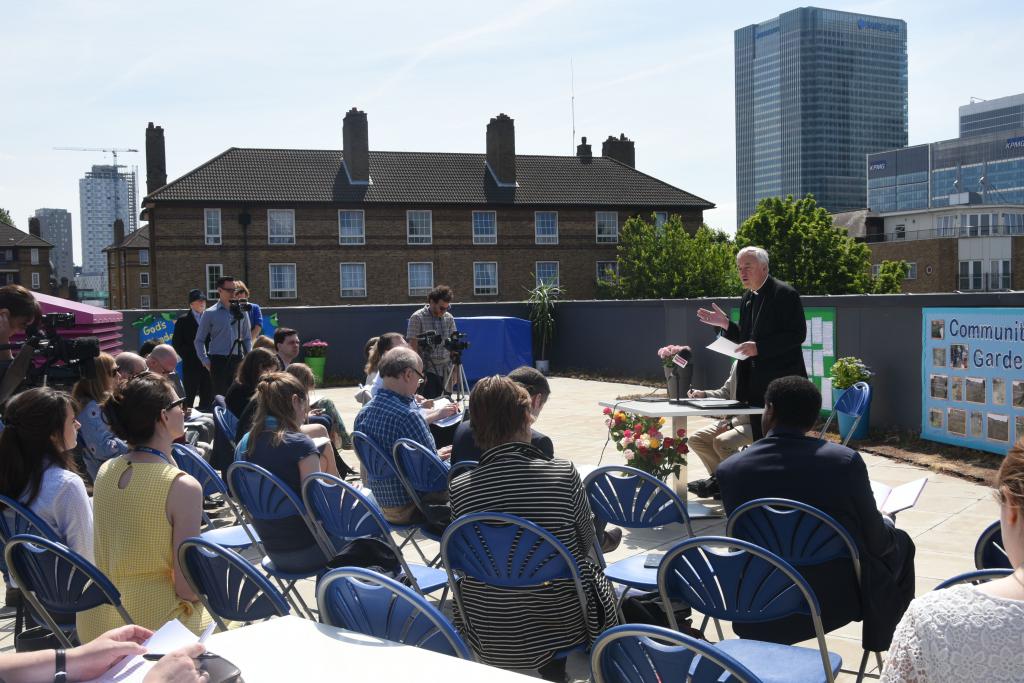Pope Francis’ much-anticipated encyclical on the ‘Care of our Common Home’, Laudato Si’, was published on 18 June. To introduce the encyclical, Cardinal Vincent joined members of the press and pupils at Our Lady and St Joseph Primary School in Poplar.
Listen to the Cardinal's briefing on the encyclical.
The morning began with an assembly in which the children sang the praises of God for His creative work. Cardinal Vincent explained to the pupils that the encyclical held a special message for them: 'Pope Francis wants you to remember to praise and thank God before you eat and again after you finish every meal.'
Later, on the school roof, Cardinal Vincent explained that it was appropriate to introduce the encyclical in this particular setting because of ‘the children’s perception and sense of wonder about the world’ and that the encyclical was about ‘care for our common home: a home that is shared by current and future generations’. The school itself was built 'with great attention to the environment and is an example of what can be done for the future’. The backdrop of Canary Wharf was a reminder that 'enterprise and business structures of the world always need special scrutiny’.
He sees the encyclical as 'a thoroughly Catholic document' for many reasons: it is the latest in a long line of traditional teaching by previous Popes; its sweep is very wide and its vision is far-reaching; it is focused on the dignity of the person; it offers an ethical challenge as well as an invitation to dialogue; and, most of all, 'it is centred on the work of God and how that work comes into its fulfilment in the person of Jesus'.
In the encyclical, the Holy Father ‘approaches the crisis in the world’s climate precisely because of its impact on people, and especially on the world’s poorest’. Its central concern is 'the dignity of the person' and our place in the created order.
The document also looks at 'integral human development'. It 'welcomes the genius of enterprise’ but cautions that ‘profit alone is not a profound enough motive to drive forward enterprise,’ noted the Cardinal.
Laudato Si’ proposes an ethical framework that ‘challenges the notion that we live in a world in where perennial and almost infinite material progress is possible, a world in which we can expect more goods and more consumption’. This, says the Pope, ‘is a false ethical framework that creates a throwaway culture’ in both goods and people.
What is proposed instead is a ‘new framework where demand is moderated by ethical considerations rather than by market forces and manipulation’, in order to provide for ‘the integral long-term development of our world’.
The encyclical explains that it is a false dichotomy to choose either the continued use of carbon fuels to alleviate poverty or to put in place strict measures to protect the environment. Instead, ‘the vision and technology’ are available which make both possible. ‘Economic development is necessary to alleviate poverty and, properly understood and designed, it is possible to do so in a way that serves the well-being of creation.’
The document also calls for an 'integral approach to ecology'. Drawing upon the practice of an examination of conscience at the end of the day, we are invited to consider 'how we have behaved in relation to the created world and its goods'. We are asked to look at what we waste, and how our lifestyle is contributing to a different culture. There is ‘no true ecological understanding without an adequate understanding of the place of the human person’.
Thus we are challenged to an 'ecological conversion' in which 'we turn again to place centrally the mystery of God … humanity and our created things are not at the centre; God is at the centre. The more we usurp the throne of God, thinking that all these things are mine to use as I like, the more we will exhaust all that has been entrusted to us in nature, the more we will continue to betray those who are left out and those who will follow behind us.'
Cardinal Vincent explained that this encyclical presents 'a challenge to every person on the planet' and that the Pope is appealing for 'a new dialogue about how we shape the future of planet’ which must ‘include everyone since the environmental challenge and its human roots concern everyone about how we shape the future of the planet'.
The full text of the encyclical is available to download here.
A summary document providing a 'map' to the encyclical is also available to download here.




